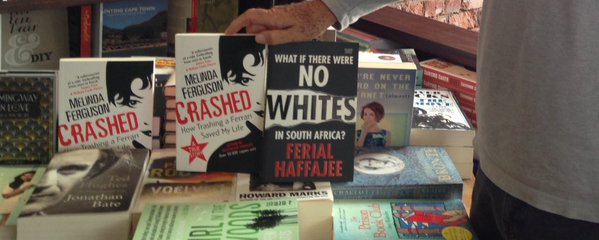Dec. 21 (GIN) – South African newspaper editor Ferial Haffajee’s new book has a sensational title for a deadly serious issue.
“What If There Were No Whites In South Africa?” is likely to provoke strong reactions all across the color divide.
Haffajee is considered one of South Africa’s thought leaders and commentators and uses her media platform to raise and discuss issues pertinent to the state of the nation.
In her new book, Haffajee examines South Africa’s history up to the present – 2015 – a tumultuous year punctuated by protests and racist incidents and attacks.
She shares her story as a black woman and successful journalist, forging a space in an emerging democracy.
What emerges from the author’s reflections, discussions and research, is that angry—often polarizing debates—about the ideology of whiteness now dominate national conversations and social media platforms. They also featured prominently in the enraged voices of the recent wave of student protests.
The #Rhodes Must Fall and #Fees Must Fall student movements started out as causes relating to specific student issues. But they escalated into a multiplicity of concerns.
The narratives that dominate the public space, she says, have morphed into intractable deeper questions about social justice and inequality. These are underpinned by the grand narrative of entrenched white supremacy in South Africa.
She writes: “As I research, I see our debates, our racialized world view is built in a world where the black and white middle class play bumper cars. It is a rivalry for how history is understood and weighted. It is a rivalry about whose culture will rule the roost.
“I know things have changed, but as I stand and survey in 2015, I see they haven’t changed sufficiently after two decades. And the pattern in workplaces is the same. It is the cappuccino – mixed to a good brown at the bottom, a layer of thick white froth and sprinkles of chocolate. The impetus for change I tracked at the start of the century has slowed. I speak to boardrooms fairly often. And, yes, if they are not in sectors with high regulation (mining, telecoms) or owned and part-owned by the state, the grooves worn by our past have not changed sufficiently.”
Before becoming editor-in-chief at City Press, Haffajee headed up the Mail & Guardian. She sits on the boards of the International Women’s Media Foundation, the World Editors Forum, the International Press Institute and the Inter Press Service, and she has won several awards, including international ones, related to media freedom and independence as well as for her reporting over the years.
The book is published by Pam Macmillan South Africa and can be purchased online at panmacmillan.co.za





